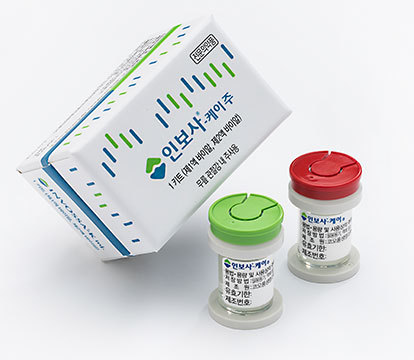Kolon Life Science to start clinical trials to extend Invossa’s target patient group
By Sohn Ji-youngPublished : Nov. 23, 2017 - 17:07
Kolon Life Science said Thursday that it has been granted permission in South Korea to begin clinical trials to prove that its new osteoarthritis drug Invossa -- currently approved for treating mid-grade osteoarthritis of the knee -- can be used for treating more severe forms of the joint disease.
The Seoul-based company said that the Korean Ministry of Food and Drug Safety has granted approval to begin phase 3 clinical trials to show that Invossa can be used for the treatment of Kellgren & Lawrence grade 2 osteoarthritis.
The Seoul-based company said that the Korean Ministry of Food and Drug Safety has granted approval to begin phase 3 clinical trials to show that Invossa can be used for the treatment of Kellgren & Lawrence grade 2 osteoarthritis.

Invossa is currently approved in Korea for patients diagnosed with K&L grade 3 osteoarthritis -- when a patient continues to experience pain after receiving pain-relief drugs or physical therapy for more than three months. When conditions worsen, the diagnosis is raised to K&L grade 2.
Kolon Life Science said the new set of clinical trials will involve 146 patients at 17 medical institutions in Korea. The trials will start in January 2018 and continue for two years, it said.
Invossa is the world’s first cell-mediated gene therapy for treating osteoarthritis of the knee, in which the cartilage that cushions the joints wears away, causing the bones to rub together and induce pain.
A single injection of the drug delivers therapeutic relief for up to two years. It was developed by Kolon Group’s US-based bioparma subsidiary TissueGene. Kolon Life Science, which owns a 14.37 percent stake in TissueGene, is in charge of Invossa’s marketing and sales in Korea.
In July, Invossa was approved by Korea’s Drug Ministry for pain relief and function improvement, but not tissue regeneration. TissueGene is looking to amass evidence of Invossa’s regenerative properties during phase 3 clinical trials slated to take place in the US next month. The firm is aiming to commercialize the drug there by 2023.
By Sohn Ji-young (jys@heraldcorp.com)









![[Hello India] Hyundai Motor vows to boost 'clean mobility' in India](http://res.heraldm.com/phpwas/restmb_idxmake.php?idx=644&simg=/content/image/2024/04/25/20240425050672_0.jpg&u=)








